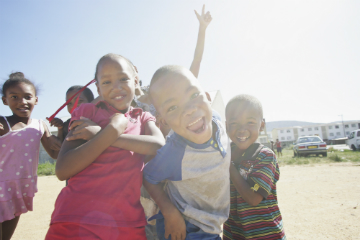National Children's Day
Children are among the most vulnerable members of society and need special protection. They're dependent on their parents, families and the government for their protection and well-being. Their best interests are always the main consideration when it comes to any matter affecting them. 
Child protection is everybody’s responsibility and we want a South Africa where all children are free from abuse, neglect and exploitation. Children’s rights are an important part of our Constitution, and have been included in Section 28 of the Bill of Rights.
On National Children’s Day, which is celebrated on the first Saturday in November every year, we aim to celebrate and highlight the progress being made towards the realisation and promotion of children’s rights.
Children’s Rights
In the Constitution, section 28 of the Bill of Rights deals directly with the rights of children. In this section "child" means a person under the age of 18 years. A child’s best interests are the most important in every matter concerning the child.
According to section 28 every child has the right:
- to a name and a nationality from birth,
- to family care or parental care, or to appropriate alternative care when removed from their family environment,
- to basic nutrition, shelter, basic health care services and social services,
- to be protected from maltreatment, neglect, abuse or degradation,
- to be protected from exploitative labour practices,
- not to be required or permitted to perform work or provide services that,
- are inappropriate for a person of the child’s age; or
- place at risk the child’s well-being, education, physical or mental health or spiritual, moral or social development,
- not to be detained except as a measure of last resort, in which case, in addition to the rights a child enjoys under
- section 12 and 35 (relating to freedom and security of the person and rights of arrested, detained and accused persons), the child may be detained only for the shortest appropriate period of time, and has the right to be,
- kept separately from detained persons over the age of 18 years, and
- treated in a manner, and kept in conditions, that take account of the child’s age.
- to have a legal practitioner assigned to the child by the state, and at state expense, in civil proceedings affecting the child, if substantial injustice would otherwise result; and

- not to be used directly in armed conflict, and to be protected in times of armed conflict.
The Children's Act 38/2005 makes it a criminal offence if a person who has to maintain a child doesn't provide the child with clothes, housing and medical care.
Primarily the Children’s Act is aimed at giving effect to the constitutional rights of children, including:
- family care or parental care or appropriate alternative care when removed from the family environment,
- social services,
- protection from maltreatment, neglect, abuse or degradation, and
- the best interests of the child are paramount importance in every matter concerning a child.
Other legislation protecting children
- The Basic Conditions of Employment Act of 1997 makes it illegal to employ a child under the age of 15.
- The Domestic Violence Act of 1998 defines different forms of domestic violence and explains how a child can get a protection order against the abuser.
- The Films and Publications Act of 1996 protects children from exploitation in child pornography.
According to the World Health Organisation (WHO), "child abuse or maltreatment constitutes all forms of physical and/or emotional ill-treatment, sexual abuse, neglect or negligent treatment or commercial or other exploitation, resulting in actual or potential harm to the child's health, survival, development or dignity in the context of a relationship of responsibility, trust or power."
In other words, abuse is when someone in a position of responsibility, trust or power knowingly harms or exploits a child, either physically or emotionally.
Please report any abuse or negligence to the Department of Social Development’s (DSD) hotline on 0800 220 250.
Other useful contacts
Lifeline Western Cape
Tel: 0861 322 322
Email: info@lifelinewesterncape.org.za
Child Welfare South Africa
Tel: 0861 424 453
Email: info@childwelfaresa.org.za
From children's rights to children's realities
More information
A MOD Centre is a hub for sport, recreation, arts and culture activities for learners in a community.
The Youth Development Strategy has opened the way for projects like our Youth Cafés, which offer skills development programmes.
Apply for this programme if you’d like to tutor primary and high school learners. Year Beyond is an educational outreach programme that aims to assist underperforming schools, while giving you the opportunity to gain new skills.


